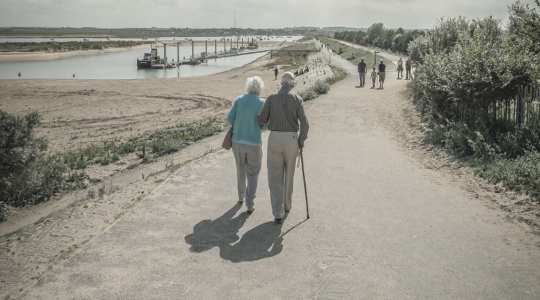 People nearing the end of their life often express fear of dying alone. Gerard Moonen/Unsplash, CC BY
People nearing the end of their life often express fear of dying alone. Gerard Moonen/Unsplash, CC BY
In nursing homes, older people are increasingly frail and being admitted to care later than they used to be. More than half of residents suffer from depression, yet psychiatrists and psychologists aren’t easily accessible, and pastoral or spiritual care is only available in a subset of homes.
Depression at the end of life is often associated with loss of meaning. Research shows people who suffer from such loss die earlier than those who maintain purpose. This can be helped by nurturing the “spirit” – a term that in this setting means more than an ethereal concept of the soul. Rather, spiritual care is an umbrella term for structures and processes that give someone meaning and purpose.
Caring for the spirit has strength in evidence. Spiritual care helps people cope in grief, crisis and ill health, and increases their ability to recover and keep living. It also has positive impacts on behaviour and emotional well-being, including for those with dementia.
Feeling hopeless
Many people have feelings of hopelessness when their physical, mental and social functions are diminished. A 95-year-old man may wonder if it’s worth going on living when his wife is dead, his children don’t visit anymore and he’s unable to do many things without help.
The suffering experienced in such situations can be understood in terms of threatening one’s “intactness” and mourning what has been lost, including self-identity.
Fear is also common among those facing death, but the particular nature of the fear is often unique. Some may be afraid of suffocating; others of ghosts. Some may even fear meeting their dead mother-in-law again.
What plagues people the most though is the thought of dying alone or being abandoned (though a significant minority express a preference to die alone). Anxiety about dying usually increases after losing a loved one.
But such losses can be transcended by encouraging people to pursue their own purpose for as long as they can; in other words, by caring for the spirit.
What is spiritual care?
Spiritual care has religious overtones that make it an uncomfortable concept in a secular health system. But such care can be useful for all – religious and non-religious – and can be provided by carers, psychologists and pastoral specialists alike.
Spirituality can be defined as “the way individuals seek and express meaning and purpose and the way they experience their connectedness to the moment, to self, to others, to nature, and to the significant or sacred”. Perhaps the Japanese term “ikigai” – meaning that which gives life significance or provides a reason to get up in the morning – most closely encompasses spirituality in the context of spiritual care.
Guidelines for spiritual care in government organisations, provided by the National Health Services in Scotland and Wales, note that it starts with encouraging human contact in a compassionate relationship and moves in whatever direction need requires. Spiritual needs are therefore met through tailoring components of care to the person’s background and wishes.
For instance, one person requested that her favourite football team regalia be placed around her room as she was dying. Another wanted her dog to stay with her in her last hours. Supporting these facets of identity can facilitate meaning and transcend the losses and anxiety associated with dying.
Spiritual care can include a spiritual assessment, for which a number of tools are available that clarify, for instance, a person’s value systems. Such assessments would be reviewed regularly as a person’s condition and spiritual needs can change.
Some people may seek religion as they near the end of their lives, or after a traumatic event, while others who have had lifelong relationships with a church can abandon their faith at this stage.
Other components of spiritual care can include allowing people to access and recount their life story; getting to know them, being present with them, understanding what is sacred to them and helping them to connect with it; and mindfulness and meditation. For those who seek out religious rituals, spiritual care can include reading scripture and praying.
Spiritual care in the health system
Psychologists or pastoral care practitioners may only visit residential homes infrequently because of cost or scarce resources. To receive successful spiritual care, a person living in a residential home needs to develop a trusting relationship with their carer.
This can best be done through a buddy system so frail residents can get to know an individual staff member rather than being looked after by the usual revolving door of staff.
Our reductionist health care model is not set up to support people in this way. Slowing down to address existential questions does not easily reconcile with frontline staff’s poverty of time. But health care settings around the world, including Scotland and Wales, the United States and the Netherlands, are starting to acknowledge the importance of spiritual care by issuing guidelines in this area.
In Australia, comprehensive spiritual care guidelines for aged care are being piloted in residential and home care organisations in early 2016.
People with chronic mental illness, the elderly, the frail and the disabled have the right to comprehensive health care despite their needs often being complex, time-consuming and expensive.
Finding meaning at all stages of life, including during the process of dying, is a challenging concept. It seems easier to get death over with as quickly as possible. But the development of new spiritual care guidelines brings us one step closer to supporting a meaningful existence right up to death.
About The Authors
Colleen Doyle, Principal Research Fellow at NARI, University of Melbourne. She was co-founder of the Australian Psychological Society’s Psychologists in Ageing Special Interest Group. She has written and published over 65 academic and technical papers in the area of aged care.
David Jackson, Research Officer Dementia and Stroke, University of Melbourne
This article was originally published on The Conversation. Read the original article.
Related Books
at InnerSelf Market and Amazon


























